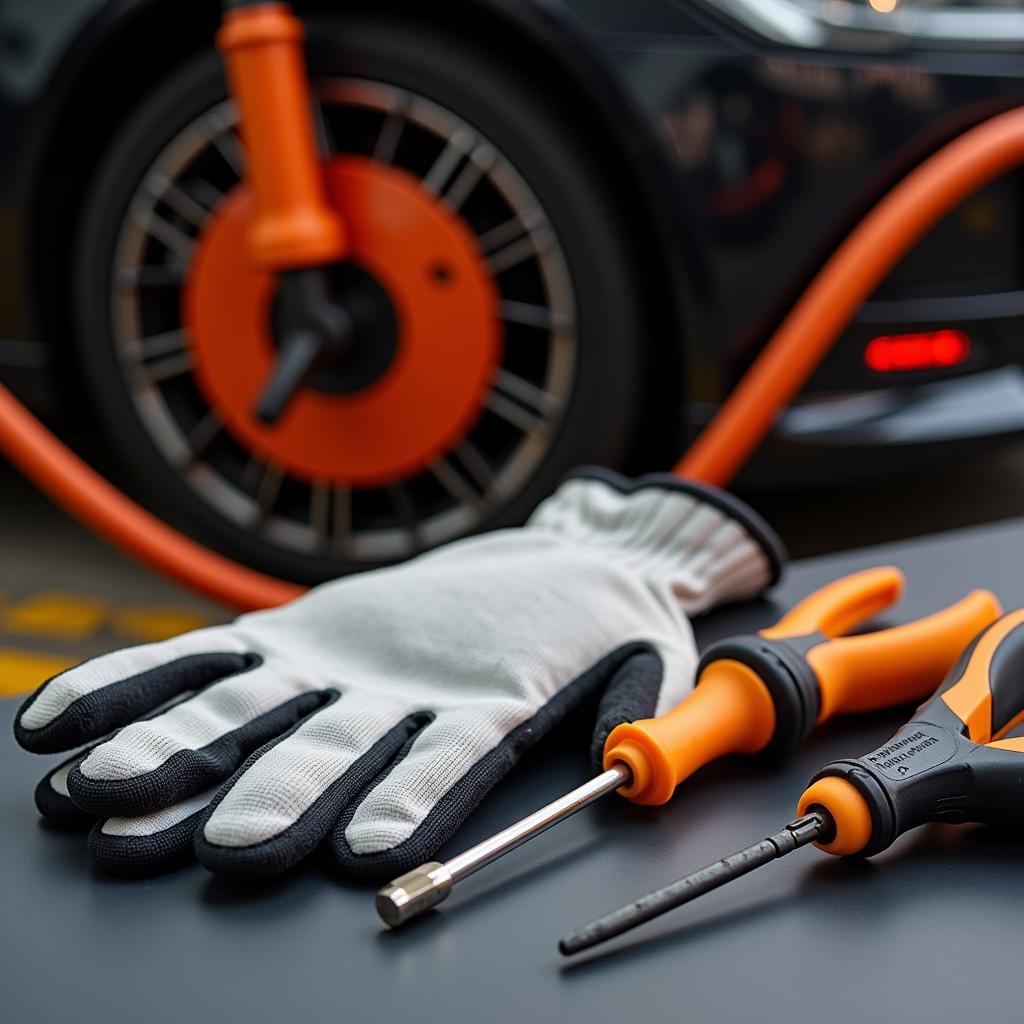Electric mobility is revolutionizing the automotive industry, and with this shift comes a new set of tools essential for maintaining and repairing electric vehicles. Understanding the specific needs of electric cars, from diagnostic software to specialized safety equipment, is crucial for both professionals and car owners. This article delves into the must-have electric mobility tools car owners and mechanics should consider.
Why Invest in Electric Mobility Tools Car Owners Need?
Electric vehicles differ significantly from their gasoline-powered counterparts, demanding unique tools for effective maintenance and repairs. Working with high-voltage systems requires specialized safety precautions and equipment, making traditional mechanic tools inadequate. Investing in the right electric mobility tools ensures safety and facilitates efficient troubleshooting and repair, ultimately saving time and money.
For instance, a dedicated diagnostic scanner designed for electric vehicles can pinpoint issues with the battery management system, electric motor, or charging system. This precision avoids unnecessary guesswork and allows for targeted repairs. Similarly, insulated tools protect against electrical shocks when working with high-voltage components. Even seemingly simple tasks like changing a tire require specific procedures and tools due to the unique weight distribution and undercarriage components of many EVs. Having the correct tools at hand streamlines the process and minimizes potential complications.
Key Electric Mobility Tools: Diagnostic & Safety
car mechanic must have tools Essential electric mobility tools fall into two main categories: diagnostic and safety. Diagnostic tools enable you to identify the root cause of a problem, while safety tools protect you from the inherent dangers of working with high-voltage systems.
Diagnostic Tools for Electric Cars
- Diagnostic Scanners: Specialized scanners designed for EVs can access and interpret data from the vehicle’s various electronic control units (ECUs), providing detailed insights into the battery, motor, and charging system health.
- Multimeters: These versatile tools measure voltage, current, and resistance, essential for diagnosing electrical faults and verifying proper operation of components.
- Insulation Testers: These specialized tools measure the integrity of insulation in high-voltage systems, ensuring safety and identifying potential insulation breakdowns that could lead to dangerous shocks or short circuits.
Essential Safety Equipment for EV Maintenance
- Insulated Gloves: Class 0 rated gloves offer the highest level of protection when working with high-voltage systems.
- Insulated Tools: Screwdrivers, pliers, and wrenches with insulated handles protect against electrical shocks when working on live circuits.
- Safety Glasses and Face Shield: Protecting your eyes and face is crucial when working with high-voltage systems. Arc flashes can cause serious eye damage.
- Voltage Detectors: Non-contact voltage detectors verify the absence of voltage before working on any electrical component.
Johnathan Davis, a seasoned EV mechanic at Green Auto Solutions, emphasizes, “Safety is paramount when working with electric vehicles. Never compromise on insulated tools and always follow proper lockout/tagout procedures.”
Navigating the Evolving Landscape of Electric Mobility Tools
The electric mobility landscape is constantly evolving, with new tools and technologies emerging regularly. Staying up-to-date with the latest advancements is crucial for both professionals and enthusiasts. Online resources, industry publications, and training courses offer valuable insights into the latest electric mobility tools and best practices.
in my career tools Beyond the essential tools mentioned above, several specialized tools are becoming increasingly important. These include battery analyzers for assessing battery health, thermal imaging cameras for detecting hot spots in electrical systems, and high-voltage disconnect switches for safely isolating the high-voltage battery.
Conclusion: Equipping Yourself for the Electric Future
The transition to electric mobility requires a new approach to car maintenance and repair. Investing in the right electric mobility tools car owners can utilize is essential for ensuring safety, efficiency, and successful troubleshooting. From diagnostic scanners to insulated tools, having the proper equipment allows you to confidently navigate the complexities of electric vehicles and embrace the future of automotive technology.
FAQs
- What is the most important safety tool when working on an EV? Insulated gloves rated for high-voltage work are essential.
- Do I need a special diagnostic scanner for my electric car? Yes, a scanner designed for EVs provides access to critical data specific to electric powertrains.
- What should I do if I suspect a problem with my EV’s battery? Consult a qualified EV technician and have them diagnose the issue with the appropriate tools.
- Where can I find reliable information on electric mobility tools? DiagFixPro offers comprehensive resources and reviews on various electric mobility tools.
- Are electric mobility tools expensive? Prices vary depending on the tool and its features, but investing in quality tools is crucial for long-term safety and efficiency.
- Can I use regular mechanic tools on my electric car? Some tools can be used, but specialized insulated tools are essential for working on high-voltage components.
- How often should I check my EV’s battery health? It’s recommended to have your battery health checked annually or as recommended by the manufacturer.
Are you ready to explore other aspects of car maintenance and specialized tools? Check out these related articles on our website: car tools for disability and mobile care experts tools.
Need expert assistance with your electric mobility tools? Contact us via WhatsApp: +1(641)206-8880, Email: [email protected], or visit our office at 910 Cedar Lane, Chicago, IL 60605, USA. Our 24/7 customer service team is ready to assist you.
